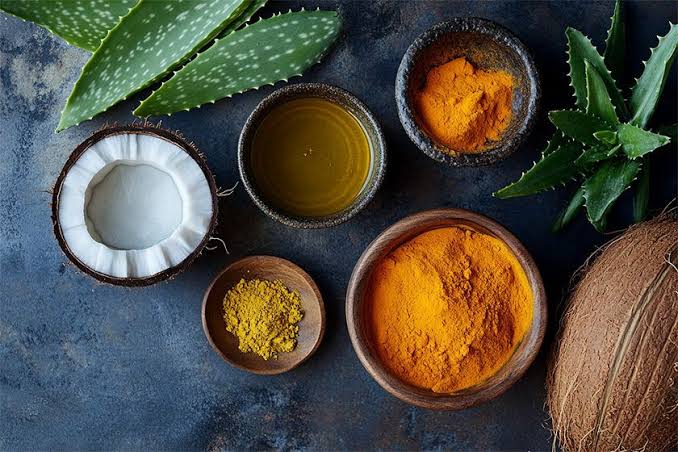 Image Source: Forest Essentials
Image Source: Forest Essentials
Natural sunscreen options are now being center stage as knowledge of the possible hazards of chemical sunscreens and the environmental consequences of conventional SPF products rises. These solutions are kinder to the environment and milder on the skin but still provide good sun protection.
Essential Points:
-
Rather than soaking UV radiation as chemical sunscreens do, natural sunscreens mainly employ mineral-based components like zinc oxide and titanium dioxide to physically block the rays.
-
Reflecting and dispersing both UVA and UVB rays for broad-spectrum protection, these minerals form a protective layer over the skin.
Why select natural sunscreen?
-
Safer for Sensitive Skin: Hypoallergenic, non-irritating, and free from contentious chemicals like oxybenzone and octinoxate, mineral sunscreens make them perfect for children, those prone to allergies, and those with sensitive skin.
-
Preferred choice for environmentally aware customers are natural sunscreens since they skip compounds detrimental to coral reefs and marine life.
-
Immediate Protection: Mineral sunscreens act immediately upon application unlike chemical sunscreens, hence eliminating the need for a waiting period to become effective.
-
Long-Lasting and Moisturizing: Many natural sunscreens include nourishing ingredients like shea butter, coconut oil, and vitamin E, which hydrate and shield the skin.
Popular Natural Sunscreen Compounds:
-
These are the only FDA-approved mineral UV filters providing dependable broad-spectrum defense: Titanium Dioxide and Zinc Oxide.
-
Boasts an amazing natural SPF (28–50) and is high in antioxidants, so nourishing the skin as well as protecting from UV radiation.
-
Carrot Seed Oil: Antioxidants abound here, and it provides natural SPF of about 30; hence, it is a favorite in natural sunscreen combinations.
-
Shea butter improves the SPF and stability of sunscreen products in addition to moisturizing.
-
Offering roughly 20% UV protection and soothing and hydrating the skin, aloe vera aids in the calming of sun-exposed skin.
Plant and Marine-Based Developments:
-
For their antioxidant and UV-absorbent characteristics, extracts from plants like Chinese skullcap (Scutellaria baicalensis) as well as marine sources such algae are being added to sunscreens.
-
These botanical extracts provide extra skin advantages including anti-aging and anti-inflammatory activity by boosting the SPF and photoprotective effects of mineral sunscreens.
Alternatives at Home and DIY:
-
Homemade sunscreens usually combine zinc oxide with beeswax and natural oils like coconut, olive, or wheat germ. Although they are adjustable, careful formulation is needed to guarantee uniform coverage and enough SPF.
-
Low-level SPF (4–20) oils like coconut, olive, and wheat germ can be used for short sun exposure, but are not replacements for high-SPF, broad-spectrum protection in strong sunlight.
Limitations and Considerations:
-
Natural oils and plant-based components on their own lack enough defense against extended sun exposure. Reliable protection calls for the use of products containing either titanium dioxide or zinc oxide, per advice of dermatologists.
-
To guarantee enough protection, always search for "broad spectrum" marking and verify SPF levels.
-
Apply natural sunscreens often, particularly following swimming or perspiration, as mineral formulas can be more easily wiped from the skin.
Encouragement of lifestyle and nutrition:
-
A diet high in antioxidants—berries, leafy greens, nuts—will help the skin to better defend itself against UV exposure.
-
Essential supplementary approaches include seeking shade during peak sun hours, wearing UPF-rated apparel, sunglasses, and hats.
Market Tendencies and Advice:
-
With companies providing colored, scent-free, and reef-safe choices for different skin types and lifestyles, the demand for natural and organic sunscreens is growing.
-
For their safety, efficacy, and environmental advantages, mineral sunscreens are constantly advised by the Good Housekeeping Institute and dermatologists.
In essence: Although DIY and oil-based treatments can augment protection, for strong defense against sun damage opt for broad-spectrum mineral sunscreens and combine them with intelligent sun practices.
Sources: Good Housekeeping, PMC, Sunnylife, Free Fly Apparel, Times of India, Sunwarrior, Lotus Botanicals, Cleveland Clinic, CeraVe, Healthline
Advertisement
Advertisement





